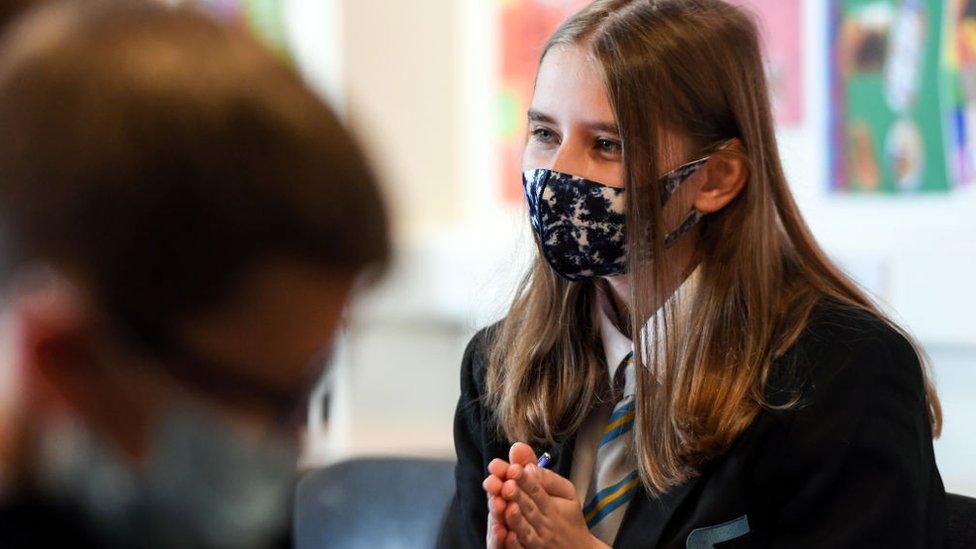Covid in Scotland: Schools to remain open this week, says Swinney
- Published
- comments

Face-to-face learning is due to restart on 18 January after the Christmas and new year break
Scotland's schools are "safe" and pupils due in this week should attend, the deputy first minister has said.
John Swinney said the prevalence of the virus in Scotland was much lower than other parts of the UK.
The education secretary also told BBC Scotland he wanted to "stick" to 18 January as the date for face-to-face learning to restart after the holiday.
Larry Flanagan of the EIS teaching union had called for schools to be closed this week.
Separately, the Scottish Conservatives want the government to be more open about its post-Christmas plans.
The party's education spokesman Jamie Greene said greater detail and answers were needed from Mr Swinney over how the education sector would be supported in the new year.
He added: "Little detail has been given as to why education has been put on hold and how on earth parents are expected to work when their childcare options have been taken away. There is no good reason why all pupils cannot return to some form of learning from 5 January as was originally planned, more so given the huge loss of teaching that so many have already suffered."
However, the EIS believed there needed to be a "firebreak" either side of Christmas.
Mr Flanagan told BBC Scotland's Good Morning Scotland programme: "One of the issues around this new variant would appear to be that particularly teenagers are involved in the transmission chain. That's why in Kent and London, even before we identified the new variant, they were looking to close schools because teenagers seem to be fairly critical now."
It has emerged that scientists are investigating "hints" that the new variant has a higher propensity to infect children.
Prof Neil Ferguson, who sits on the UK government's New and Emerging Respiratory Virus Threats advisory group (Nervtag), stressed that a link had not yet been proven.
But he added: "If it were true, then this might explain a significant proportion, maybe even the majority, of the transmission increase seen."
Mr Flanagan said that a "major rethink" on how education was delivered would need to be carried out if teenagers were found to be critical in spreading the virus.
'Our schools are safe'
But Mr Swinney said it was the Scottish government's "highest priority" to maintain school education for children and young people in Scotland.
He explained: "The loss of schooling and interaction of that type is damaging for children and young people and that is the strongest public health advice that we've got."
The education secretary said parents should not be keeping their children at home for the last few days of term if they were due in school.
"Today Scotland has, comparatively speaking, very low levels of coronavirus compared to other parts of the UK - 115 cases per 100,000 in Scotland, 625 per 100,000 in Wales 467 per 100,000 in London," he said.
"Our schools are safe. So children and young people that should be going to school for some days this week... should go to school."
The delayed start to the spring term was announced by First Minister Nicola Sturgeon on Saturday as she outlined the tightening of restrictions over Christmas and a level four lockdown for mainland Scotland from 26 December.
Ms Sturgeon said "firm preventative action" was needed after the emergence of a faster-spreading strain of coronavirus.
Pupils will now resume learning from 11 January remotely, with face-to-face schooling not starting until at least 18 January. Vulnerable children and the children of key workers will return on the originally scheduled term start dates.
'Significant impact on children'
But Mr Swinney said the dates would be kept under review.
"I want to stick to 18 January and we will be reviewing the situation as we go into the new year, to monitor the cases, to look at the evidence in front of us and to take the right and appropriate decisions to make sure that our schools are operating on a safe basis," he said.
Sarah Chisnall, from parents campaign group 50-50, told BBC Scotland she was worried about the impact a delayed return could have on pupils due to sit prelim exams.
She wants the Scottish government to introduce a "national standard" for blended learning.
She added:"Prelims are going to make up a good part of pupil's assessment this year, so they're really concerned.
"Unless we have a national standard of at-home and online learning we are really worried that some individual schools won't be able to maintain learning at the progress rate that's needed."
Scotland's children and young person's commissioner, Bruce Adamson, has warned that any closures to school should be limited and kept under review.
"The coronavirus pandemic is a public health emergency for Scotland, but since schools first closed in March I have been clear that this is a children's human rights emergency as well," he said.
"In order to tackle coronavirus we must support the government's focus on the right to health - and, indeed, the right to life - but we must do everything in our power to mitigate the significant impact on children."

